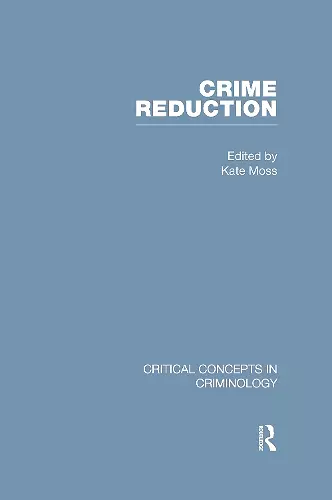Crime Reduction
Format:Set / collection
Publisher:Taylor & Francis Ltd
Published:10th Dec '08
Currently unavailable, and unfortunately no date known when it will be back

Across the globe, challenging and contentious issues about community safety and security increasingly exercise governments and police forces—as well as, for example, town planners and car-park designers. Consequently, as a specialist area within the wider discipline of criminology, crime reduction has never before enjoyed such prominence in public and scholarly discourse. With research on and around the subject flourishing as never before, this new title in the Routledge Major Works series, Critical Concepts in Criminology, meets the need for an authoritative reference work to make sense of the subdiscipline’s colossal literature and the continuing explosion in research output and practice. Edited by Kate Moss, a prominent academic in the field, Crime Reduction is a four-volume collection of foundational and cutting-edge scholarship.
The first volume in the collection (‘Approaches to Reduction’) brings together the best research on the different approaches to crime reduction, including its classification and theory, and ideas of what is preventable. The work gathered here also includes criticisms of crime reduction, not least research around the phenomena of displacement and sustainability.
Volume II (‘Motivation of the Criminal Inclination’) collects the most important work on issues of crime reduction, particularly those concerned with what one thinker has described as ‘structure and psyche’. The scholarship in this volume draws both on the structural perspective (which emphasizes the view that reduction is achievable only through economic and social change, especially by ameliorating inequality or levels of social exclusion), and the ‘psyche’ approach (which regards crime principally as a product of the human spirit and seeks to change criminal inclination and activity by policies of, for example, deterrence, incapacitation, and reform).
The notion of situational crime reduction has been a particularly active area of research in recent years. But the idea that changes to the social and physical settings in which crime may occur can reduce its frequency or impact is far from uncontroversial. Volume III (‘Situational Crime Reduction’) assembles the best thinking in this area tackling, for example, ethical dilemmas about the impact of some reduction strategies on our freedom and privacy rights, as well as the difficult and profound implications that arise from the increasing extent to which crime reduction has become the de facto responsibility of private rather than state organizations.
The final volume in the collection (‘Crime...
ISBN: 9780415452830
Dimensions: unknown
Weight: 3061g
1672 pages